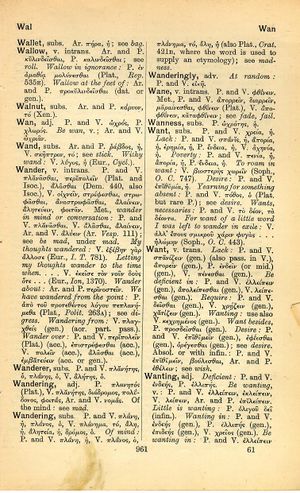wander: Difference between revisions
ἀγαπήσεις τὸν πλησίον σου ὡς σεαυτόν → love your neighbor as yourself, thou shalt love thy neighbour as thyself, love thy neighbour as thyself
m (Text replacement - "<b class="b2">Polit.</b>" to "''Polit.''") |
m (Text replacement - " . . ." to "…") |
||
| Line 8: | Line 8: | ||
<b class="b2">My thoughts wandered: </b>V. ἐξέβην γὰρ [[ἄλλοσε]] (Eur., ''I. T.'' 781). | <b class="b2">My thoughts wandered: </b>V. ἐξέβην γὰρ [[ἄλλοσε]] (Eur., ''I. T.'' 781). | ||
<b class="b2">Letting my thoughts wander to the time when. | <b class="b2">Letting my thoughts wander to the time when.…</b> V. [[ἐκεῖσε]] τὸν νοῦν δοὺς ὅτε... (Eur., ''Ion'', 1370). | ||
<b class="b2">Wander about</b>: Ar. and P. περινοστεῖν. | <b class="b2">Wander about</b>: Ar. and P. περινοστεῖν. | ||
Revision as of 10:45, 25 February 2019
English > Greek (Woodhouse)
v. intrans.
P. and V. πλανᾶσθαι, περιπολεῖν (Plat. and Isoc.), ἀλᾶσθαι (Dem. 440, also Isoc.), V. οἰχνεῖν, στρέφεσθαι, στρωφᾶσθαι, ἀναστρωφᾶσθαι, ἀλαίνειν, ἀλητεύειν, φοιτᾶν.
Met., wander in mind or conversation: P. and V. πλανᾶσθαι, V. ἀλᾶσθαι, ἀλαίνειν, Ar. and V. ἀλύειν (Ar. Vesp. 111); see be mad, under mad.
My thoughts wandered: V. ἐξέβην γὰρ ἄλλοσε (Eur., I. T. 781).
Letting my thoughts wander to the time when.… V. ἐκεῖσε τὸν νοῦν δοὺς ὅτε... (Eur., Ion, 1370).
Wander about: Ar. and P. περινοστεῖν.
We have wandered from the point: P. ἀπὸ τοῦ προτεθέντος λόγου πεπλανήμεθα (Plat., Polit. 263A); see digress.
Wandering from: V. πλαγχθείς (gen.) (aor. part. pass.).
Wander over: P. and V. περιπολεῖν (Plat.) (acc.), ἐπιστρέφεσθαι (acc.), V. πολεῖν (acc.), ἀλᾶσθαι (acc.), ἐμβατεύειν (acc. or gen.).

